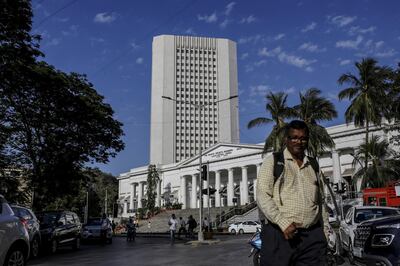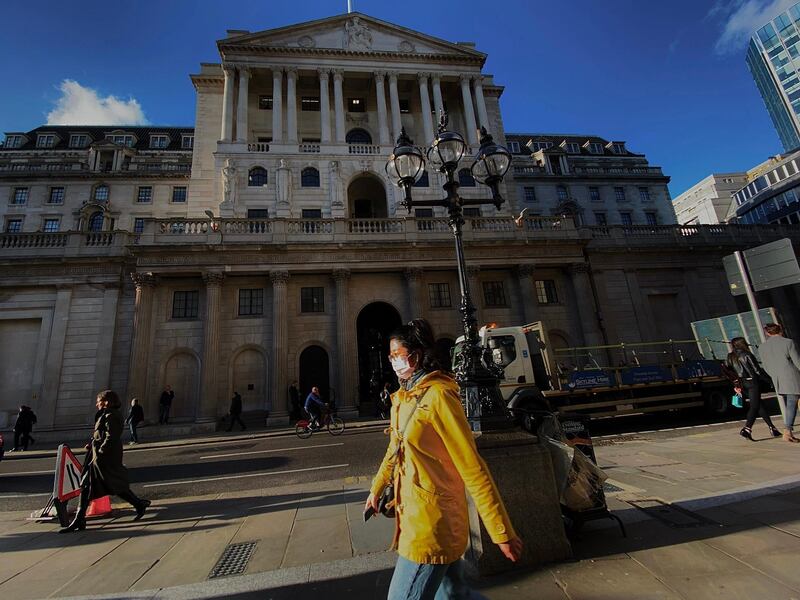Policymakers and government leaders across the globe have taken a range of approaches to deal with the economic fallout from the coronavirus.
Here is a summary of how some of the world's biggest economies and economic blocs, as well as the UAE, have reacted.
United States
President Donald Trump instructed the Treasury Department to defer tax payments without interest or penalties on Wednesday for certain individuals and businesses negatively impacted, saying it would provide more than $200 billion (Dh734.5bn) of additional liquidity to the economy.
Mr Trump also said he was ordering the Small Business Administration to provide capital and liquidity to firms affected by the coronavirus by providing low-interest loans to small businesses in affected states and territories, effective immediately. And he suspended all travel from Europe, with the exception of US citizens and legal permanent residents, to the US for 30 days starting on Friday.
Mr Trump has also signed an $8.3bn emergency spending bill to combat the spread of the virus and develop vaccines for the highly contagious disease.
The US Federal Reserve has cut interest rates by half a percentage point in its first emergency rate move since the height of the 2008 financial crisis. Investors expect more cuts in the weeks ahead.
China
China said it had earmarked 110.5 billion yuan (Dh58.1bn) to fight the epidemic.
Beijing has ramped up funding support for virus-hit regions and the country's central bank has cut several of its key rates, including the benchmark lending rate, and has urged banks to give cheap loans and payment relief to exposed companies.
China will modify the environmental supervision of companies to help the resumption of production disrupted by the coronavirus epidemic, giving firms more time to rectify environmental problems.

Japan
Japan unveiled a second package of measures worth about $4bn in spending to cope with the fallout of the coronavirus outbreak, focusing on support to small and medium-sized firms, as concerns mount about risks to the fragile economy.
Separately, Bank of Japan Governor Haruhiko Kuroda has pledged to pump more liquidity into markets and step up asset buying.
Japan's central bank may also take steps to ensure companies hit by the coronavirus outbreak do not face a financial squeeze before the end of the current fiscal year in March, according to sources.
European Central Bank
The ECB, the central bank of the euro zone, has so far avoided cutting interest rates. Policymakers did hold an unscheduled meeting on March 3 but it was to discuss operational responses to coronavirus, such as whether to hold events and staff shortages, rather than any policy response, sources said.
The ECB has asked euro zone banks to review their business continuity plans and the actions they can take to prepare for and minimise the potential adverse effects of the coronavirus, according to a letter seen by Reuters.
The European Union
European Union leaders have so far failed to agree radical measures to tackle the crisis. The head of the bloc's executive Ursula von der Leyen said the European Commission will set up a joint investment fund with firepower of €25bn (Dh103.7bn) from existing resources to cushion the blow to vulnerable sectors of the bloc's economies.
Germany
Germany's centre-left coalition agreed to increase public investments by €12.4bn by 2024 and to make it easier for companies to claim subsidies to support workers on reduced working hours to counter the effects of the coronavirus epidemic.
Chancellor Angela Merkel's conservatives are split over whether Germany should rush out a fiscal stimulus package to counter any impact of the coronavirus on Europe's largest economy.
Budget experts estimate the government has the fiscal room for additional measures worth at least €17bn. Some officials say that Berlin could even put together a stimulus package worth up to €50bn, without ditching the government's policy of no new debt.
United Kingdom
The UK launched a £30bn (Dh141bn) economic stimulus plan just hours after the Bank of England slashed interest rates, a double-barrelled package aimed at warding off the risk of a coronavirus recession.
The BoE cut interest rates by half a percentage point and offered banks cheaper funding and a reduction in capital buffers in an emergency move to bolster Britain's economy against disruption caused by the coronavirus outbreak.
Australia
Australia's government said on Thursday it would pump A$17.6bn (Dh41.6bn)) into the economy to try to stop the coronavirus outbreak triggering a recession.
The stimulus package - the country's first since the 2008 global financial crisis - will subsidise the wages of 120,000 apprentices, offer one-off cash payments for welfare recipients and give up to A$25,000 to small businesses, said Prime Minister Scott Morrison.
More than 6 million welfare recipients, notably pensioners and the unemployed, will receive a one-off cash payment of A$750 from March 31.
France
French Finance Minister Bruno Le Marie has said that Europe needs to be ready to use fiscal stimulus to deal with the impact of the coronavirus.
The government is allowing companies to suspend payments of some social charges and taxes, and is activating state-subsidised short-time work schemes. It has ordered the Bpifrance state investment bank to guarantee loans needed to overcome short-term cash flow problems.
Paris has also allowed companies to declare force majeure due to the outbreak if they cannot honour a contract with the public sector, and is putting pressure on big companies to show similar leniency with subcontractors.

India
The Reserve Bank of India plans to infuse fresh cash liquidity into the system through a second round of long-term repo operations (LTRO), government officials told Reuters, amid fears that the coronavirus outbreak will derail any revival of economic growth. One official said the RBI might inject as much as 1 trillion rupees (Dh495 million) in the round that will begin as early as April.
The RBI has said it stands ready to act to maintain market confidence and preserve financial stability.
The government is, meanwhile, pushing state-run banks to approve new loans amounting to 500-600bn rupees by the end of March, according to sources.
Italy
Italy has doubled the amount it plans to spend on tackling its coronavirus outbreak to €7.5bn and is raising this year's deficit goal to 2.5 per cent of national output from the current 2.2 per cent target.
Payments on mortgages will be suspended across the whole of Italy and Italy's banking lobby ABI said lenders would offer debt moratoriums to small firms and households grappling with the economic fallout from the virus.
Canada
Finance Minister Bill Morneau said on March 9 that the government was "looking at taking some initiatives this week", as Canada reported its first coronavirus death, with a steep decline in oil prices expected to hit the world's fourth-largest crude producer hard.
The Bank of Canada lowered its benchmark overnight rate to 1.25 per cent from 1.75 per cent in response to the epidemic, prompting money markets to price in a better-than-even chance of another reduction next month. The last time it cut by 50 basis points was in 2009 during the financial crisis.
South Korea
The government announced a stimulus package of 11.7tn won (Dh356m) to cushion the impact of the largest outbreak of coronavirus outside China.
Finance Minister Hong Nam-ki said the supplementary budget, subject to parliamentary approval, would channel money to the health system, childcare and outdoor markets. An additional 10.3tn won in treasury bonds will be issued this year to fund the extra budget.
Seoul has also dramatically tightened rules on short-selling for three months. Starting March 11, stocks with a sudden and abnormal increase in short-selling transactions will be suspended from further short-selling for 10 days.

UAE
The Central Bank of the UAE said on Wednesday it will support the country’s banking system to offset the effects of the virus on the UAE economy.
The regulator has established a committee to ensure there is no disruption in critical services to individual or corporate consumers. The entity said it directed banks in the country to have sufficient cash loaded at their ATMs while branches were informed to update customers in case there was a change in opening hours.
The central bank first asked lenders to review their business continuity plans at the end of last month, with financial institutions expected to implement measures such as "rescheduling loan contracts, granting temporary deferrals on monthly loan payments as well as reducing fees and commissions" for customers affected by the virus.










